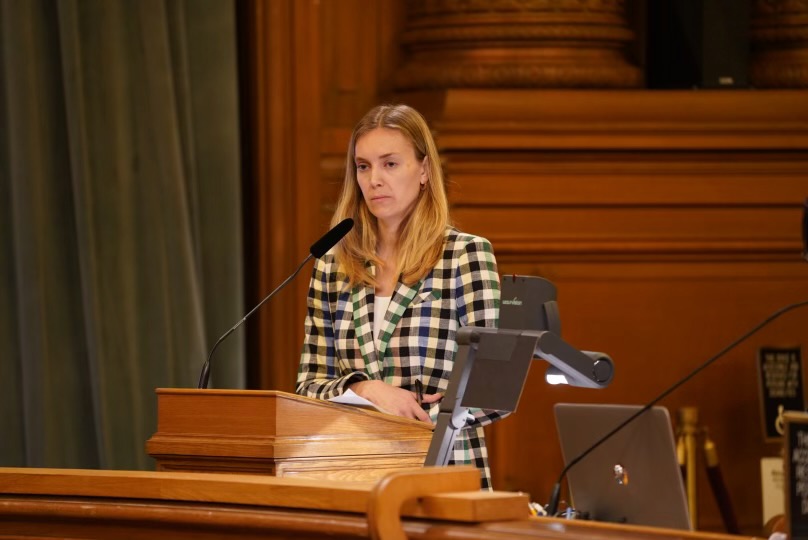San Francisco’s annual budget deficit could climb to $1.4 billion by 2027 if costs continue to outstrip revenue flowing into city coffers, according to forecasts presented by city budget experts on Wednesday.
The mounting gap comes as high office vacancy rates drive down key income sources for the city, including property transfer taxes and business taxes. Meanwhile, salary and benefit costs are set to skyrocket in coming years, according to city projections.
“This is not going to be a positive presentation today. We’re in a tough spot,” said Anna Duning, Mayor London Breed’s budget director, before laying out the soaring deficit forecast.
The fiscal year beginning this July will bring a $245 million deficit, with a $555 million shortage expected the following year. If the city doesn’t take corrective action, according to forecasts, that shortage will grow to a nearly $1.4 billion deficit by 2027.
The growing deficit has grim implications for city services.
After proposing record spending in 2023, Mayor London Breed asked department heads in December to plan for budget cuts of 10%. Meanwhile, her office has told departments to press pause on hiring new full-time employees outside of key staffing areas related to public safety and essential operations, a move that may exacerbate already-severe staffing shortages across local government.
Saving money on staffing may prove complex, however, as contracts for more than 25,000 public workers are set to expire June 30.
Labor organizers are ramping up for a tough fight over the contract negotiations. They want the city to preserve services and address staffing shortages despite the bleak budget outlook, according to Jennie Smith-Camejo, a spokesperson for Service Employees International Union Local 1021.
The union coalition staged a rally in front of City Hall Wednesday, setting the stage for a political showdown that could reshape the closely watched 2024 mayoral race.
Why Such a Large Deficit?
Salaries and benefits are set to climb nearly $600 million in the next four fiscal years, more than any other cost for the city, according to the Mayor’s Office. One significant factor driving that increase is health care costs for employees, which spiked nearly 10% this year.
Meanwhile, the bottom has fallen out on key revenue sources the city has relied on in the past. Over the past five years, estimates show that revenues from business, sales, hotel, parking and real estate transfer taxes have dropped by roughly 20%.
For example, each time a building in San Francisco is sold, the city takes a cut in the form of a transfer tax. During the booming 2010s, that tax regularly pulled over $500 million into city coffers each year. But after Covid reshaped Downtown, San Francisco’s commercial property market cooled dramatically and transfer taxes dropped below $200 million in the last fiscal year, logging the lowest total since 2011, according to the Mayor’s Office.
Meanwhile, businesses have increasingly been disputing their city tax bills. In one case, General Motors has taken the city to court over a $108 million tax tab that it says is improper.
Making matters worse, the hospitality industry’s bounce back post-pandemic has plateaued well below previous rates, according to the Mayor’s Office, leaving the question open as to when, if ever, the money tourists brought into the city will bounce all the way back.
At the Wednesday meeting, Supervisor Connie Chan questioned whether the city’s failure to significantly grow revenue could signal that the mayor’s strategy of focusing on revitalizing Downtown by attracting major events and promising tax exemptions for new businesses hasn’t worked.
But Duning preached patience.
“What we saw during the pandemic was a seismic shift in the economic foundation of this city,” Duning said. Any changes the San Francisco makes now will take time to bear fruit, she added.
On that point Chan agreed, emphasizing the high stakes for this year’s budget process.
“The decisions we make today, in this fiscal year and in the next fiscal year, is actually really critical,” Chan said.
